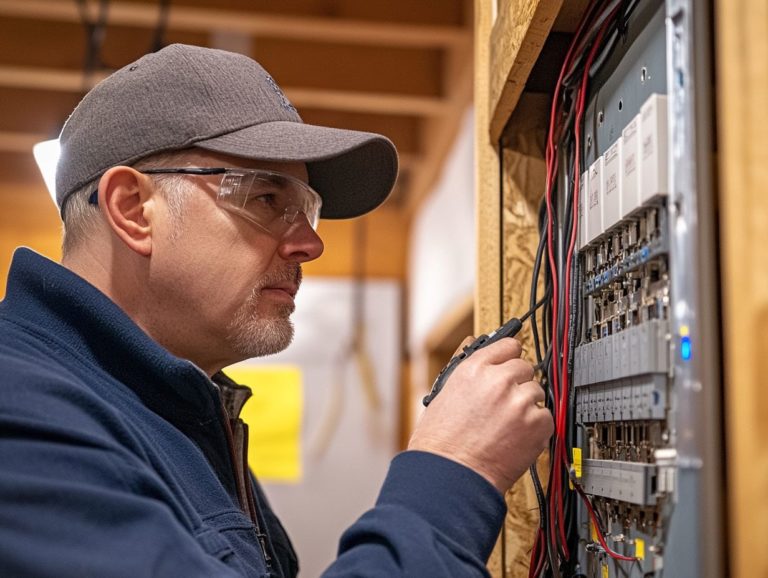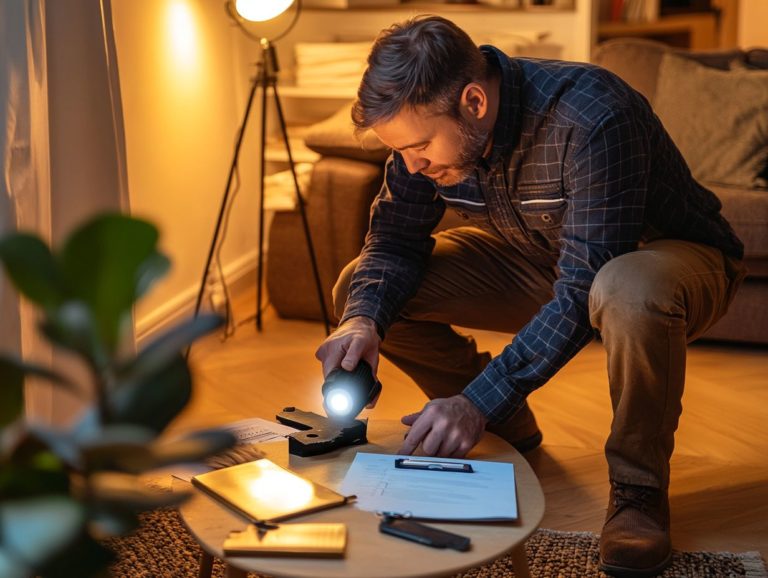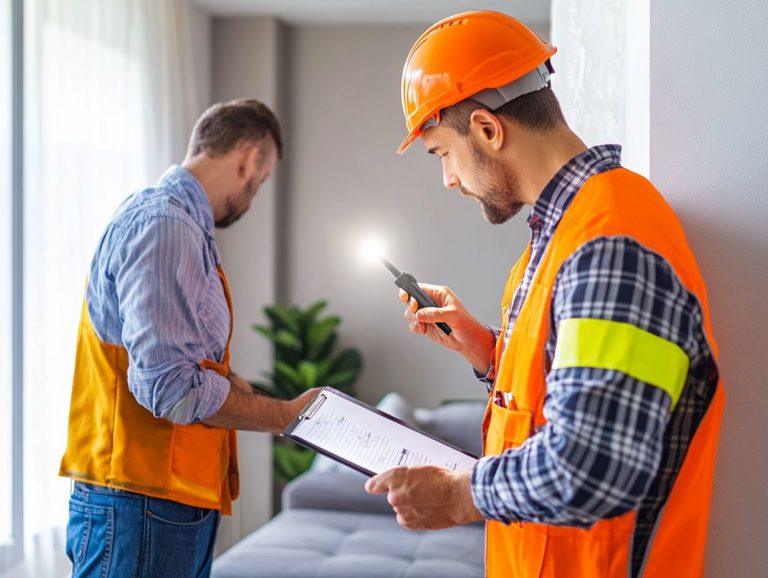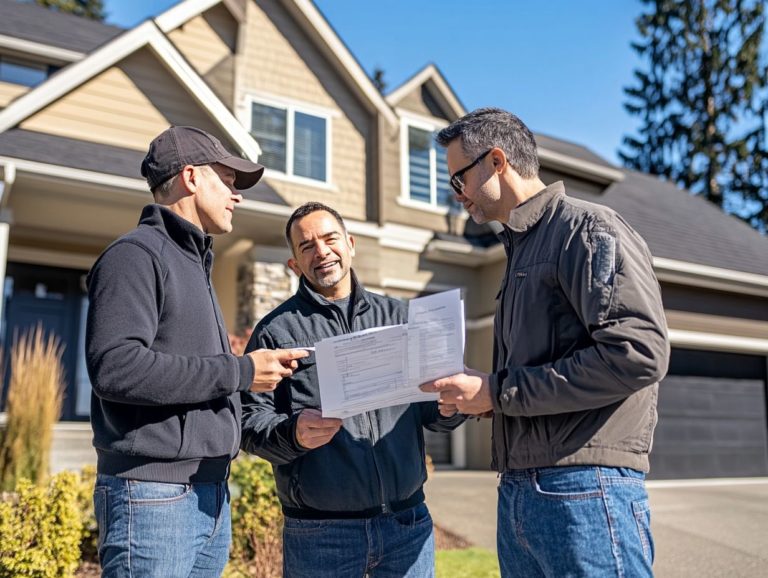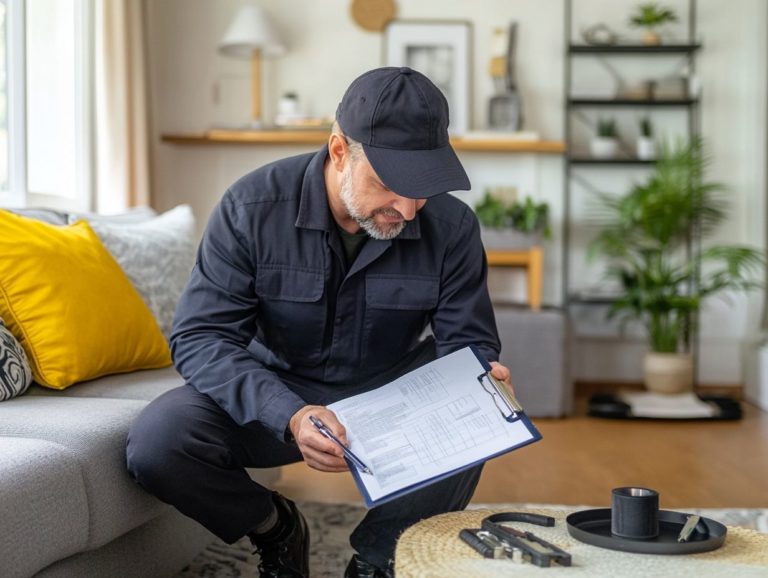The Role of Technology in Home Inspections
In a world where technology influences nearly every facet of life, home inspections are no exception. Get ready to discover how technology is transforming home inspections! This article delves into the evolution of technology within this essential field, charting its course from manual assessments to the advanced digital tools at your disposal today.
Explore how innovations such as thermal imaging, drones, and virtual reality not only enhance efficiency and accuracy but also foster improved communication among all parties involved. This article will address the challenges that accompany these advancements and ponder the future developments that could further revolutionize home inspections.
Whether you are a homeowner, a prospective buyer, or a professional in the industry, grasping these technological shifts is vital for successfully navigating the contemporary real estate landscape.
Contents
Key Takeaways:
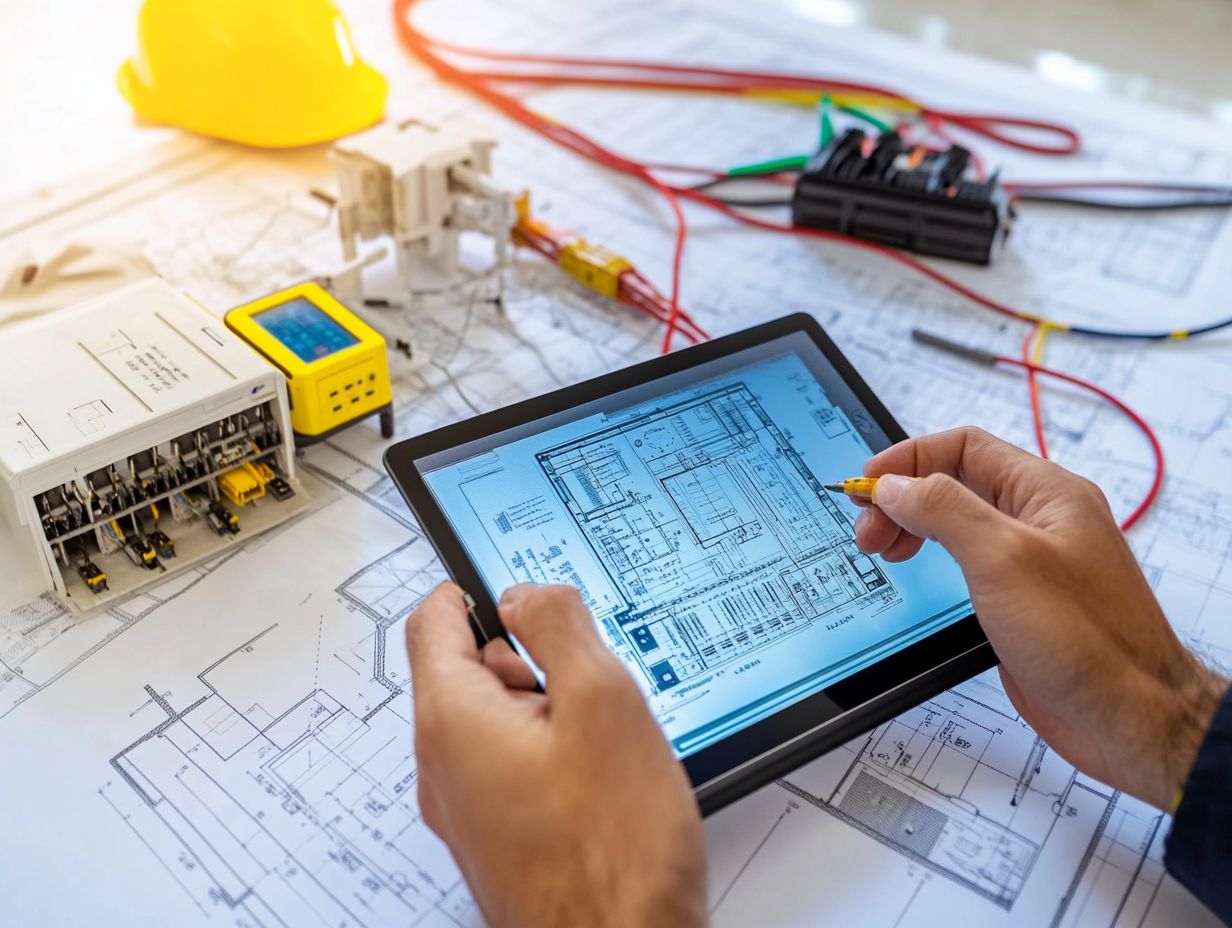
What is a Home Inspection?
A home inspection is a careful check of a property’s condition, typically carried out by a certified inspector. This process assesses various essential aspects. These include structural integrity, electrical systems, plumbing, and safety features.
For you whether you re a homeowner, homebuyer, or real estate professional in San Jose this thorough check is important. It enables you to make informed decisions regarding property transactions and maintenance needs.
Inspectors employ advanced tools, such as moisture meters and thermal imaging, to uncover potential issues that might not be visible at first glance. This significantly enhances the accuracy and efficiency of the assessment.
During the inspection, critical components like the roof, foundation, and HVAC systems undergo thorough scrutiny. This allows the inspector to provide you with a detailed report on the property’s strengths and weaknesses.
As a homeowner, this insight can reveal necessary repairs before you list your home, potentially saving you from costly surprises later. For real estate professionals, having a robust inspection report is crucial for negotiating effectively and can make the difference in closing the deal.
Ultimately, this proactive approach builds trust and transparency throughout the transaction process, creating a more secure experience for everyone involved.
The Evolution of Technology in Home Inspections
The home inspection industry has experienced a remarkable transformation, shifting from traditional manual assessments to a sophisticated, integrated approach that harnesses state-of-the-art technology.
Drones, thermal imaging cameras, and artificial intelligence now play pivotal roles in enhancing both the accuracy and efficiency of property evaluations.
This evolution has redefined how inspectors conduct their assessments and enabled homeowners and real estate professionals in San Jose with detailed, interactive reports.
These reports are seamlessly accessible through cloud-based software and mobile applications, making the entire process more user-friendly and insightful.
Thermal imaging uses infrared cameras to detect heat differences, helping to find hidden issues. AI, or artificial intelligence, helps analyze data quickly to identify potential problems.
Understanding these advancements will give you an edge in today s real estate market.
From Manual to Digital: A Brief History
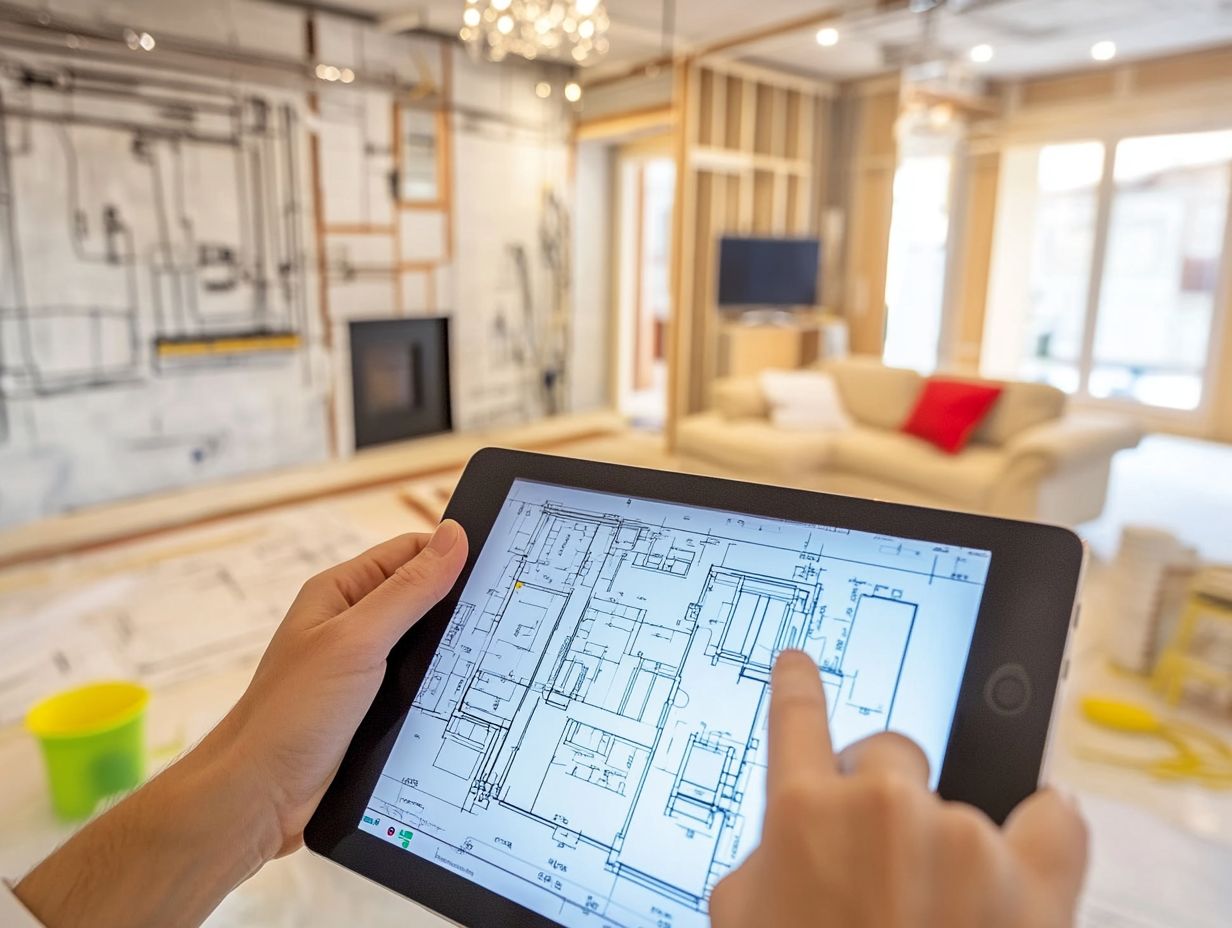
The shift from manual to digital inspections in the home inspection industry is transformative. It significantly enhances the efficiency and accuracy of property assessments. You now have modern technology and tools at your fingertips that were once unimaginable.
In the early days, home inspections relied solely on checklists and manual reporting. This often led to inconsistencies and missed issues. However, mobile apps and online storage services have revolutionized the experience for both inspectors and clients.
These digital solutions brought features like real-time data entry and automated reporting. They also create smooth communication channels that elevate the client experience by providing instant access to reports and findings.
This evolution from paper-based methods to advanced technology shows a dedication to quality. It ensures that buyers and sellers are enabled to make informed decisions.
Benefits of Using Technology in Home Inspections
Utilizing technology in home inspections brings a wealth of advantages. It enhances the quality and reliability of property assessments, making it essential for real estate professionals and homebuyers.
Interactive reports generated through online storage services provide real-time updates. This guarantees that everyone involved has access to the latest information.
Efficiency and Accuracy
The efficiency and accuracy of home inspections have significantly improved thanks to technology. Drones and thermal imaging are advanced tools that allow inspectors to conduct thorough assessments swiftly. This not only streamlines the inspection process but also helps detect issues like moisture problems or structural anomalies that might otherwise go unnoticed.
Imagine how inspectors can effortlessly access hard-to-reach areas like rooftops using drones. This drastically cuts down on the time spent on ladders. Meanwhile, thermal imaging cameras highlight temperature variations, making it easy to spot potential energy leaks or electrical issues.
As a homeowner, you stand to gain immensely from these technological advancements. Expect more comprehensive reports and quicker resolutions for any issues that arise. Don’t miss out on leveraging these tools for the best possible inspection results!
Improved Communication
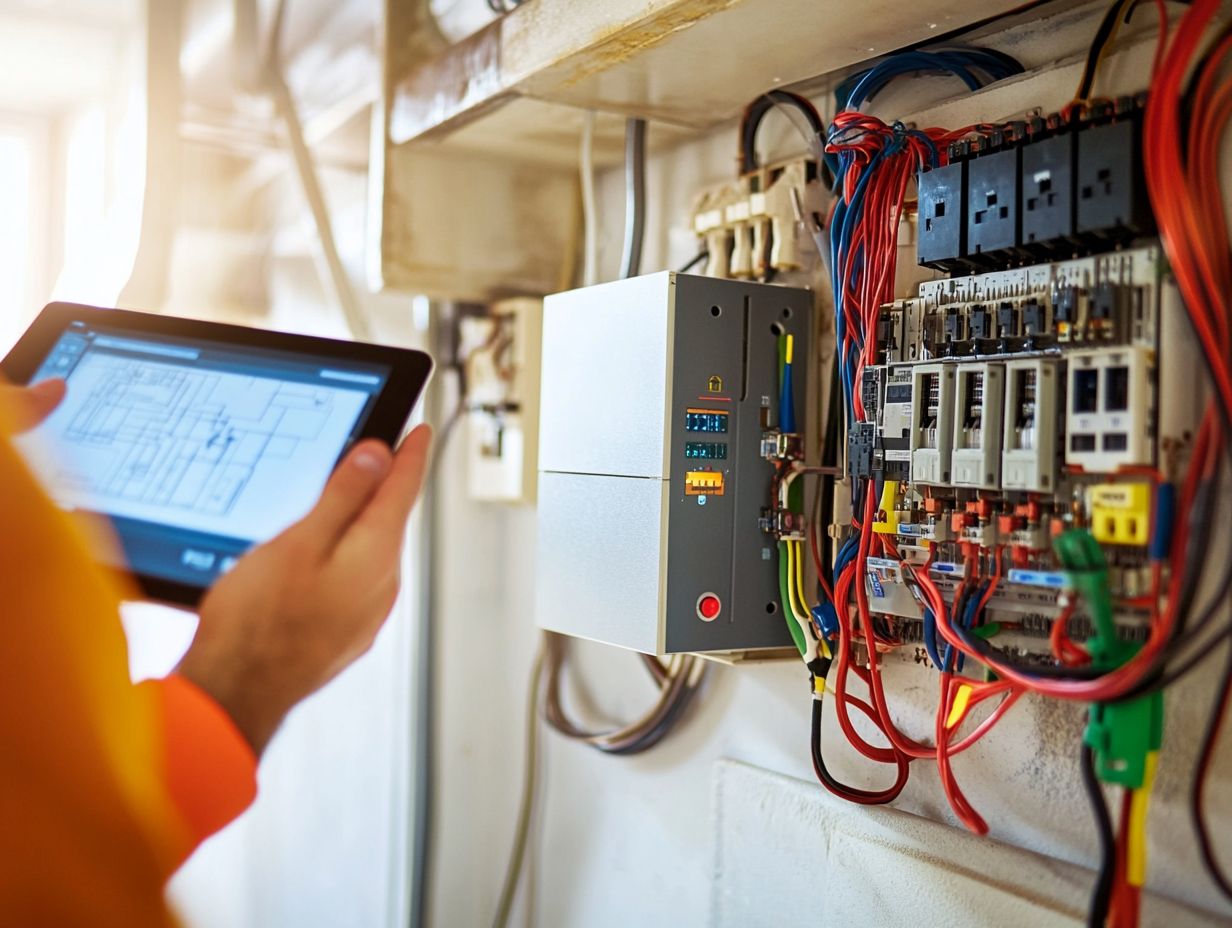
Improved communication between home inspectors, homeowners, and real estate professionals is a major advantage of incorporating technology. With mobile apps and online storage services, inspectors can generate interactive reports that provide immediate insights.
This ensures that everyone is informed throughout the inspection process. This shift to digital enhances clarity and simplifies how information is shared.
You can easily access detailed visuals and explanatory notes from your device. This makes it simpler to understand the implications of various issues identified during the inspection. Real estate professionals also receive detailed analytics that come with these reports, enabling better communication with their clients.
How would it feel to have instant access to your inspection reports? By embracing these technological innovations, home inspectors promote knowledge-based decision-making and build trust throughout the home-buying journey.
Types of Technology Used in Home Inspections
In the realm of home inspections, a variety of advanced technologies are significantly improving the effectiveness and thoroughness of evaluations. These tools help inspectors uncover issues that might otherwise slip through the cracks.
For instance, thermal imaging cameras and drones have become essential in the industry, providing valuable insights into a property’s condition. Meanwhile, virtual reality is emerging as an exciting way to visualize inspection results, offering a dynamic experience for both homeowners and real estate professionals.
Thermal Imaging
Thermal imaging technology has transformed home inspections, allowing you to uncover moisture, heat loss, and other hidden issues behind walls and ceilings issues that are often invisible to the naked eye.
Using thermal imaging cameras enables comprehensive evaluations that provide invaluable insights into a property s condition, making this tool essential in today s home inspection landscape.
This advanced approach helps you identify roof leaks, electrical faults, and insulation deficiencies, significantly enhancing preventive maintenance.
The cameras capture infrared radiation, which is a type of energy we can’t see but can feel as heat. They create images that reveal temperature variations, allowing you to quickly pinpoint areas of concern.
This capability not only boosts the accuracy of your assessments but also strengthens negotiations by equipping buyers and sellers with solid data about the property s state.
Ultimately, thermal imaging serves as a crucial asset in protecting your investment and ensuring peace of mind in home ownership.
Drones
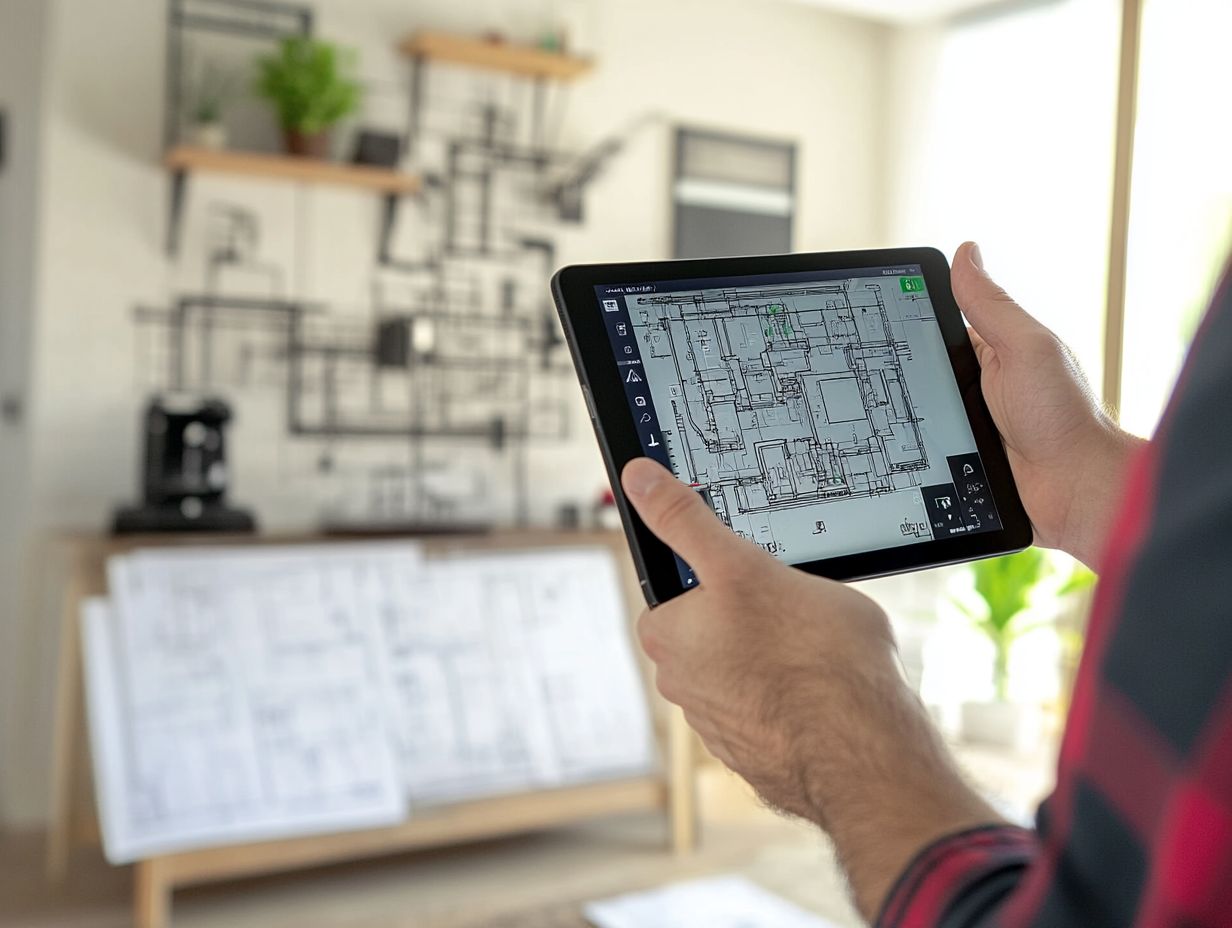
Drones are not just tools; they are game-changers in home inspections! They give you the ability to access hard-to-reach areas like rooftops, gutters, and other elevated structures with ease and safety.
This advanced service elevates the quality of property assessments and dramatically reduces the time required for thorough inspections. You gain a comprehensive view of the property that traditional methods might miss.
With high-resolution imaging capabilities, drones enable detailed visual documentation, making it easy to spot potential issues such as water damage or structural deficiencies. This helps you make informed decisions, whether you’re a homeowner or a prospective buyer, while also adding accountability. The data collected can serve as invaluable evidence during negotiations.
Incorporating drones into the inspection process minimizes safety risks for inspectors, significantly reducing the reliance on ladders and scaffolding. This shift promotes a more efficient and accurate evaluation of the property.
As technology rapidly evolves, integrating drones into home inspections becomes critical for real estate professionals committed to delivering exceptional service.
Virtual Reality
Virtual reality technology is starting to carve out its place in the home inspection industry, providing a groundbreaking way to present findings.
Imagine immersive, interactive reports that allow homeowners and real estate professionals to visualize issues in a three-dimensional space. This innovative approach enhances understanding and facilitates more effective communication and decision-making regarding necessary property repairs or improvements.
By integrating virtual reality into your inspections, you can offer virtual walkthroughs of properties, highlighting areas that may need attention such as structural concerns or systems maintenance. This technology doesn t just engage the viewer; it transforms complex data into intuitive visual formats.
As a homeowner, you gain a clearer picture of your property’s condition, while real estate professionals can leverage these visual reports to present findings to clients, ultimately fostering trust and transparency.
As this technology continues to evolve, it promises to streamline the buying and selling process, enhancing the overall value and experience of property transactions.
Embrace these advanced technologies today to ensure your home is safe and sound!
Challenges and Limitations of Technology in Home Inspections
Technology has greatly improved home inspections, but it comes with challenges. Potential errors in data interpretation and technical issues can occur during assessments.
Understanding these challenges is vital for inspectors, homeowners, and real estate professionals. It helps set realistic expectations and highlights the risks of relying too heavily on tech.
Possible Errors and Technical Issues
Errors can arise when using advanced tools like moisture meters and thermal cameras. If misused, these devices may provide inaccurate readings.
Inspectors must be well-trained and knowledgeable about these technologies. This training reduces the risk of errors and misinterpretations.
Misreading results can lead to overlooked issues such as water leaks or insulation failures, causing financial loss for homeowners. Moisture meters can sometimes give false positives, and thermal cameras may misread temperature shifts due to outside heat sources.
Thorough training and hands-on experience are crucial to avoid these pitfalls. This expertise helps inspectors deliver reliable results and accurately report risks.
Improving your technical know-how not only boosts your credibility but also builds trust with clients during inspections.
The Future of Home Inspections with Technology
Exciting changes are coming to home inspections! Ongoing technology advancements promise to enhance the quality, efficiency, and accuracy of property assessments.
Innovations like artificial intelligence, integrated inspector tools, and cloud-based software are set to redefine industry standards. These improvements will make inspections more reliable and accessible for both homeowners and real estate professionals in San Jose and beyond.
Potential Advancements and Impact on Industry
Potential advancements in technology, such as artificial intelligence and cloud-based software, are set to significantly impact the home inspection industry. These innovations promise to streamline the inspection process and improve accuracy.
By embracing advanced technologies, you will be better equipped to provide comprehensive assessments that meet the changing needs of homeowners and real estate professionals. Imagine AI algorithms analyzing data patterns, enabling you to identify potential issues swiftly. This allows for proactive measures rather than merely reacting to problems after they arise.
Cloud-based platforms facilitate seamless collaboration among inspectors, agents, and clients, ensuring everyone has access to real-time updates and reports. This transparency enhances communication and fosters trust among all parties involved.
As these tools continue to advance, the integration of virtual reality for walkthroughs and automated reporting systems is likely to redefine the home inspection process. Ultimately, this will enhance the experience for both homebuyers and sellers, making inspections a valuable part of the real estate journey.
Frequently Asked Questions
What is the role of technology in home inspections?
The role of technology in home inspections is to enhance the accuracy and efficiency of the inspection process. It allows inspectors to gather and analyze data, identify potential issues, and provide detailed reports to clients, making it crucial to understand the role of home inspectors.
What are some examples of technology used in home inspections?
Examples of technology used in home inspections include thermal imaging cameras (cameras that can see heat, helping to find hidden issues), moisture meters, drones, and inspection software. These tools help inspectors detect hidden problems and provide thorough documentation for clients.
How does technology improve the accuracy of home inspections?
Technology such as thermal imaging cameras and moisture meters can detect issues not visible to the human eye, improving inspection accuracy. It also allows inspectors to gather and analyze data more efficiently, leading to thorough reports.
What are the benefits of using technology in home inspections?
The benefits of using technology in home inspections include faster and more accurate inspections, improved documentation for clients, and the ability to detect hidden issues that might not be visible during a traditional visual inspection.
Is technology replacing the need for human home inspectors?
No, technology is not replacing the need for human home inspectors. While it enhances the inspection process, it cannot replace the human eye and critical thinking skills vital for thorough inspections. Home inspectors still play an essential role.
Are there any potential downsides to using technology in home inspections?
One potential downside of using technology in home inspections is the reliance on its accuracy. If the equipment is faulty or not properly calibrated, it could lead to inaccurate results. Home inspectors must regularly maintain and calibrate their equipment to ensure accurate readings.
Explore the world of tech-enhanced inspections today and transform your practice!

